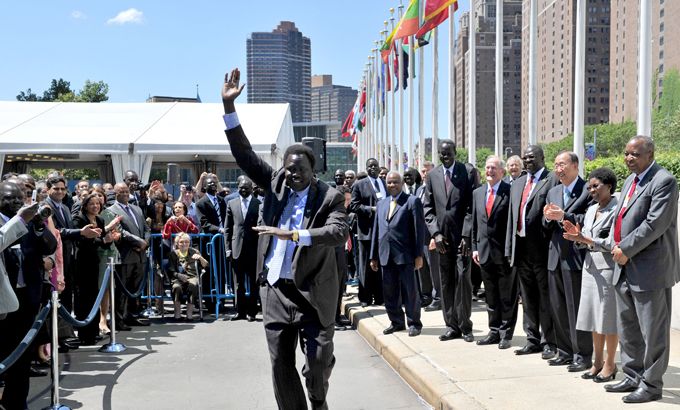South Sudan gains UN membership
General Assembly vote makes country 193rd member of the United Nations at event called “historic” by vice-president.

The UN General Assembly has admitted South Sudan as the 193rd member of the United Nations.
The vote followed the African country’s achievement of independence on Saturday, breaking away from Sudan after more than 50 years of on-and-off war.
“I declare South Sudan a member of the United Nations,” Joseph Deiss, president of the General Assembly, said after Thursday’s vote.
The independence declaration for the world’s newest state followed a January referendum in which southerners voted to secede from the north.
The vote for independence was held under the terms of a 2005 peace deal that ended a 20-year war between north and south Sudan.
Riek Machar Teny-Dhurgon, the South Sudanese vice-president, called the ceremony “historic and also an emotional day” for the people of Sudan “to be accepted; to be admitted into the international community”.
Al Jazeera’s Kristen Saloomey, reporting from the United Nations in New York, said the support for South Sudan was unanimous.
“The vice-president raised South Sudan’s flag above the United Nations. It’s now flying along with 192 other member states in front of this iconic building,” she said.
“But he acknowledged that there are many challenges ahead for his country and pledged to meet those challenges and the international community also pledged to stand by him.”
|
South Sudan’s vice president speaks to AJE |
“Welcome, South Sudan. Welcome to the community of nations,” Ban Ki-moon, the UN secretary general, said.
Sudan became independent in 1956 but was long plagued by conflict between its mainly Muslim Arabic-speaking north and its black African south, where many are Christian or follow traditional beliefs.
The Security Council, which has to rule on all UN membership applications, had recommended on Wednesday that the assembly admit South Sudan.
Presenting the resolution to the assembly, Jeff Radebe, South African justice minister, said South Sudan was an exception to the African practice of adhering to colonial borders and “in no way creates a precedent for separatist tendencies”.
Meanwhile, Omar al-Bashir, Sudan’s president, said his country would issue a new currency following the loss of oil revenues resulting from South Sudan’s independence.
Al-Bashir also told the National Assembly in Khartoum, the capital, that his government would work with South Sudan to resolve outstanding issues.
More than 75 per cent of what was Sudan’s daily oil production comes from the South, though there are no refineries there and the South has to send oil exports through the north.
The two nations are still at odds over an oil-rich border region. Al-Bashir says such issues would be resolved through “mutual respect”.